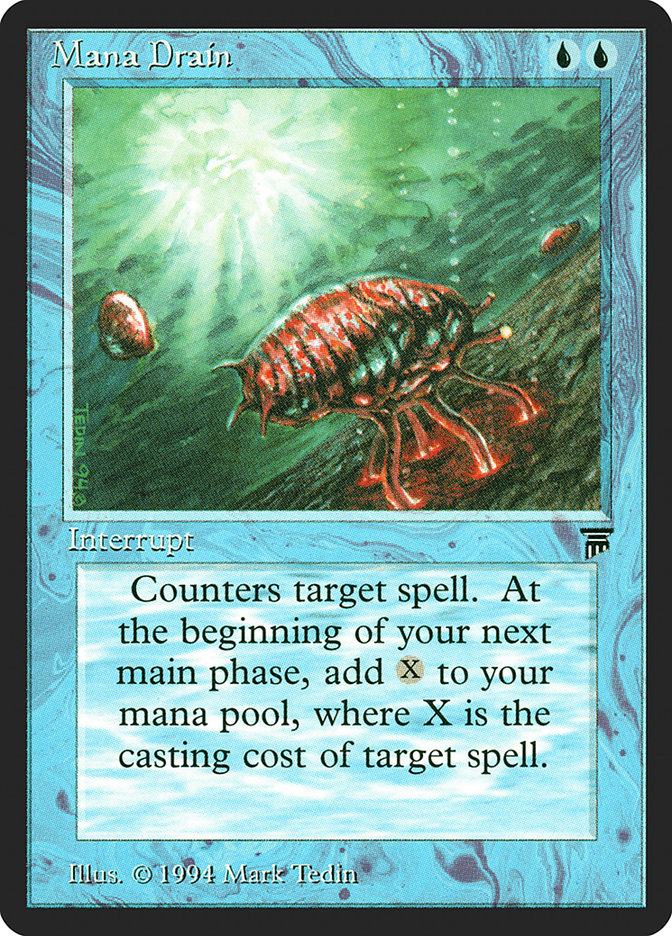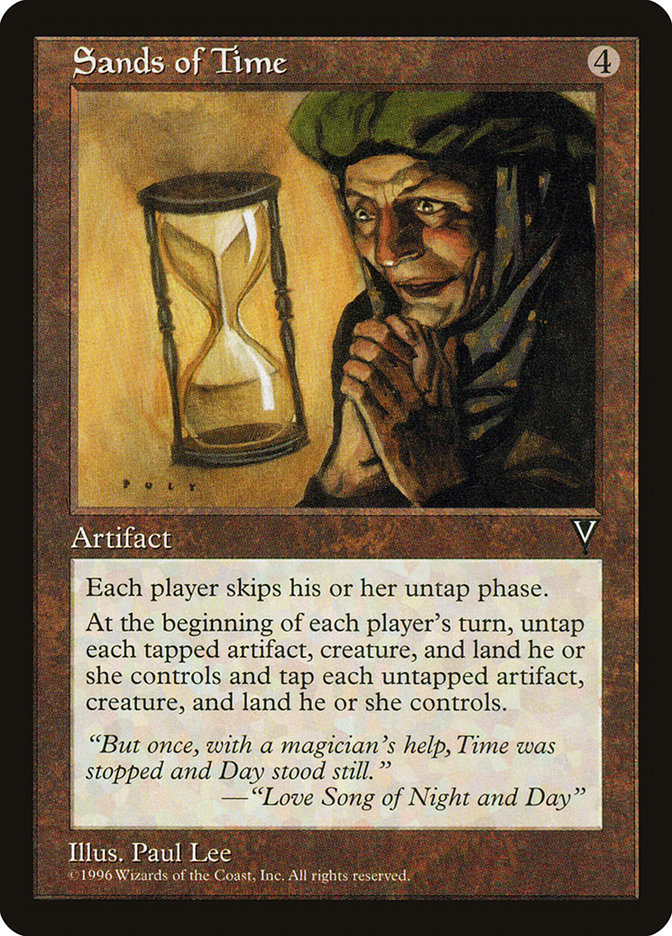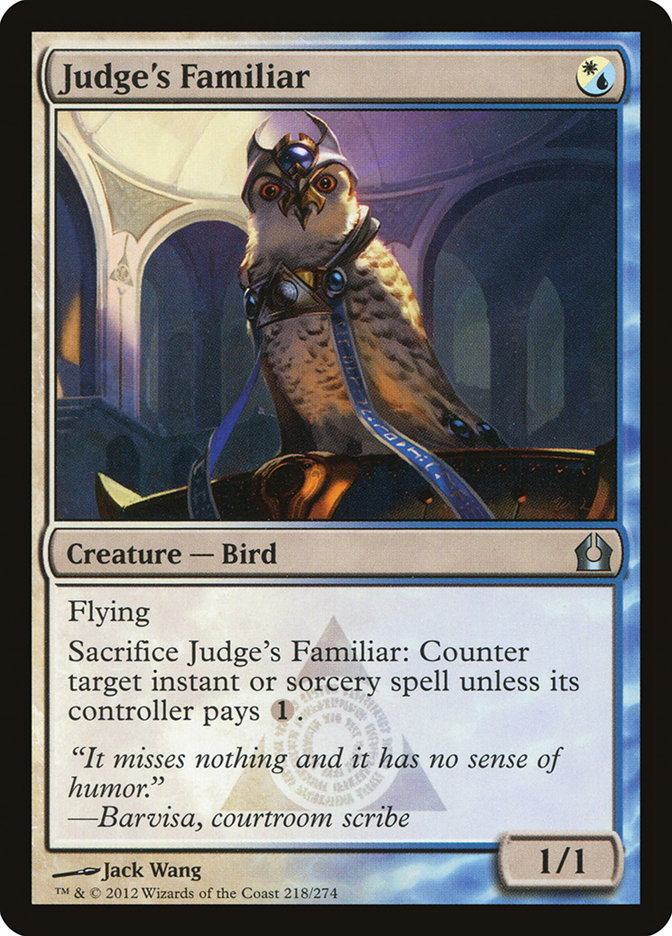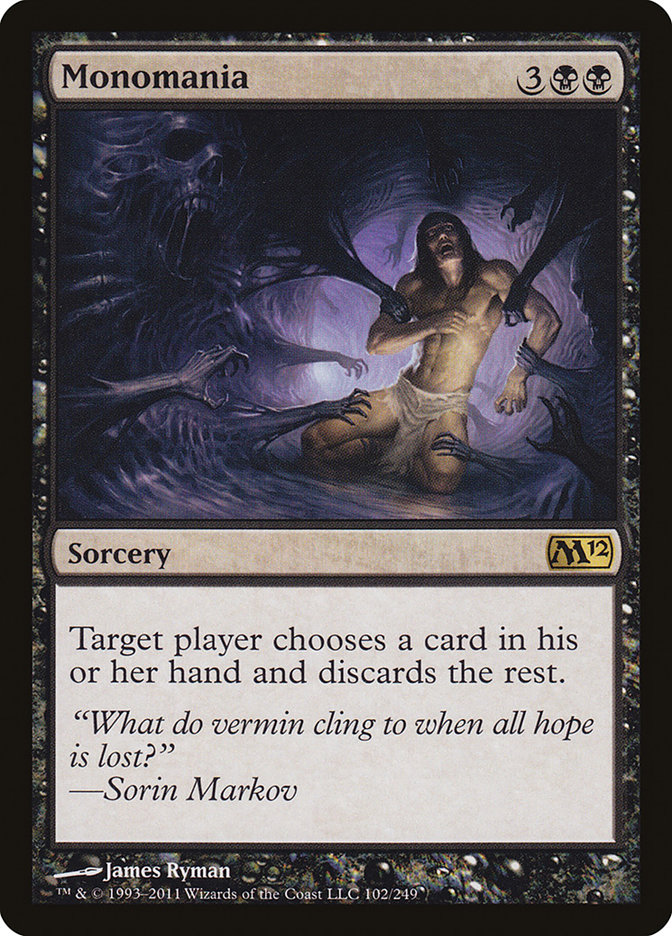Pack. Magic.
Draft. Magic.
Sit down. Magic.
Stand up. Magic.
Pass out. Magic.
Wake up. Magic.
Fade it. Magic.
Topdeck. Magic.
Magic is a big part of your life.
It’s easy to feel like you’re the smallest fish in the pond because the tournaments you attend serve as constant reminders that you aren’t as good as you want to be. Taking all of that aside, you are still likely in the top 1% of Magic players on Earth.
Magic is enormous.
If you reach the point in Magic that involves reading articles on StarCityGames.com, the amount of Magic you were getting without it wasn’t enough. Instead of stopping at the kitchen table and enjoying the cards that you opened straight out of booster packs, you asked your friends for a place to read about Magic, look at all of the cards, a place to order more cards, or even just a place to hear other people do nothing more than talk about Magic.
At what point does it stop? When do you take a step back and say “No, I’ve had enough Magic for today.”? Where is the proverbial line in the sand that forces you to think to yourself, “I deal with ‘real life’ instead of fiddling with cardboard.”? It’s different for everyone.
After several years at a card store, I’ve heard every reason under the moon for people deciding to quit Magic for good: it’s too expensive, not fun anymore, they hate “net-deckers,” it’s too time-consuming. Most people who say they don’t have time for it don’t take time to understand where they are in Magic and what they want out of the game relative to what they can achieve.
Roughly a year or so ago, I posted a thread on Facebook asking other Magic grinders how they balanced real life and their Magical alter-ego.
Despite us talking on rare occasions, Andrew Shrout gave me a kernel of the most profound Magic advice I’ve gotten:
“Balancing Magic-life and real-life becomes much easier when you realize that there isn’t a difference between the two. Magic is just part of your real life.”
Isolating aspects of one’s life is a common aspect in therapy when one is having trouble separating oneself from a particular part of one’s life. It’s easy to see why so many people tend to gravitate towards separating what they do in Magic from what they do everywhere else. Maybe they’re embarrassed to like Magic. Some people still prefer to keep their Magic life in the closet for fear of being embarrassed in their social circles.
Whatever the justification, self-evaluation is an important step in setting attainable goals in Magic, and forming a healthy relationship with the game.
What do you want?
Seriously. What are you doing? Do you want to achieve something? Why? How are you making steps to get there?
The answer to this question changes over time, and that’s okay! Understanding what you are trying to do is going to help define how much time you should be spending on Magic.
If you want something (and you don’t have it yet), then it’s likely that something needs to change for you to get there. If what you are doing isn’t good enough, or isn’t in line with what you want to achieve, fix it.
Is Commander the only thing you want out of Magic? Maybe it’s better to pick up a Mana Drain instead of the umpteenth box of Kaladesh.
Do you want to qualify for the StarCityGames.com Invitational? What are you doing to make that happen? Which Invitational Qualifiers are you attending? What format? Are you playtesting in that format?
Are the friends you’ve gained from the game the most integral part of Magic? Help get those friends on the same page. What are you doing to foster the community that you and your friends have become a part of?
Nobody can tell you what it is you want. Only you truly know what you want out of Magic. Throwing darts in a dark room isn’t going to help you hit anything. Try turning on the lights and finding out where the dartboard is.
Allocating Time
Where are you putting Magic? What part of which day of the week gets to be “Magic time?” It doesn’t have to be a static time, but figuring out when that time is makes it much easier than just trying to force Magic to happen when it doesn’t fit.
If you’re reading articles at work, your work is likely going to suffer. If you’re balancing a manabase when you should be listening to a professor, your grades will suffer. If you’re hiding in the bathroom to check spoilers on a breakfast-date, your datemate may never be the wiser, but you’re seriously doing them a disservice.
If your plan is to reach your next level in Magic play, it is going to take time. Make time to do it.
“Emma, I don’t think I have the time for that.”
This is definitely coming from a pretty privileged viewpoint, but if you have the ability to travel to events, then you have the time to get better at Magic. “I don’t have the time” oftentimes is synonymous with “I’m not willing to make the time.”
To draw from my own life, I tend to divvy the time in my life as such:
- Monday – Hour of getting ready for the day, twelve hours of work, hour of driving, hour of article, hour of decklist scouring/article reading, hour of eating, seven hours of sleep.
- Tuesday – Six hours of article writing, two hours of miscellaneous errands (bill paying, mail, pharmacy, etc.), four hours of time with my family (I don’t live with them), six to seven hours divided between streaming and playtesting, five to six hours of sleep.
- Wednesday – Hour of getting ready for the day, twelve hours of work, hour of driving, hour of eating, two to three hours of playtesting or streaming, six to seven hours of sleep.
- Thursday – Hour of getting ready for the day, twelve hours of work, hour of driving, hour of eating, hour or two of playtesting and finalizing decklist(s) for the weekend, hour of packing, six to seven hours of sleep.
- Friday – Travel to tournament city, submit decklist, make sure cards are acquired, etc. Sleep for six or seven hours.
- Saturday – Play tournament, return to hotel room when possible and sleep between six and eight hours.
- Sunday – Finish tournament, return home, sleep between four and six hours.
This isn’t meant to be some sort of sob-story related to my working twelve-hour shifts three days a week, or brag that I’m lucky enough to have a job that gives me the weekends off. This is to illustrate a point. I want to get better at Magic, and have made sacrifices to other aspects of my life to get to the point in Magic that I am now.
Video games are great, but I don’t really play them. I used to play a lot of Mario Kart 8 but decided to devote time to streaming instead.
Partying is a fun thing to do in your 20s, but so is traveling to a different city each weekend in the name of playing Magic. So I chose to partake in the latter rather than the former.
This is just one extreme on the scale, and there are even people who work in Magic (what most people would call Pro Magic Players) who choose to dedicate their entire life to the game instead of something more lucrative. It doesn’t have to be that way for you.
Just figure out what you are going to do in order to accomplish your goals. I touched on a bit before, but it isn’t nearly as hard to fit Magic into your life when you begin viewing it as a part of your “real” life. People don’t compartmentalize “football life,” “drinking life,” or “Netflix life” from the rest of their life. All of these things are just hobbies that people strive to have a healthy relationship with.
Picking Your Poison
This ties the last few points together in a way that does justice to “What are you doing in Magic?” Anything that can be considered a goal is going to take time to achieve and will require some sort of sacrifice. What sacrifices are you willing to make? What will these sacrifices help you accomplish?
If you just want to bring your game up a bit and take down your Friday Night Magic tournament, try to find someone like-minded in your area that is willing to meet and jam games a night or two a week. Realize how to utilize your time to the best of your ability. Michael Majors had one of the better articles on StarCityGames.com this year that was dedicated solely to playtesting as efficiently as possible.
There are so many ways to play Magic, and it’s okay to take it one step at a time. If you want to win a Pro Tour, you need to qualify for a Pro Tour, which means you either need to do well at a Grand Prix or Regional Pro Tour Qualifier. Assuming you take the Regional Pro Tour Qualifier path, that means you need to win a Preliminary Pro Tour Qualifier. What are you going to do to reach that level?
Maybe it means playing a little bit less Overwatch. Perhaps Netflix needs to take a back seat for a while. It could even lead to reading more Magic articles in lieu of scrolling through an endless sea of notifications on social media.
It’s also okay to deal with Magic in ways that aren’t as conventional; and that statement is multi-faceted in and of itself. It’s possible to be a competitive Magic player without traveling every single weekend, and it’s also possible to enjoy Magic without being competitive, or even playing for that matter.
If you have a family and a job that both consume larger portions of your life, it’s important to make each time to “swing the bat” count, so-to-speak. This means that it should be important to value playtesting over playing in events, and make sure that you can be as prepared as possible when a larger event (think: an SCG Tour stop or a Grand Prix) comes within a few hours of your area. It’s less likely that you’ll be able to achieve the sample-size of events required to balance out a few bad beats at smaller competitive events, so it is imperative to try to make your successes count as much as possible.
If playing competitive Magic isn’t your jam, what is?
If you’re interested in judging, use online resources or your local game store to try to get a reasonable foothold in the judging community. There are droves of great people in the program, and new faces are welcome!
Commander? There’s an infinitely deep well of resources online to give you the intel on every infinite combo, manabase, archetype, and so on to let you get a leg up on your friends. There are even forums dedicated to alternate rules to introduce to Commander to add strange and interesting dynamics to make a ‘normal’ game of Commander as whacky as possible.
The internet is an amazing resource. If you’re reading this, you likely have access to Google, so get on there and start digging.
Moderation
Creating a healthy relationship with Magic isn’t remotely as easy as it sounds as I type this. Similar to talking about a diet, or a regular exercise regimen, or whatever change one has to introduce into their life, it’s hard to exercise forbearance. The most famous Magic-related comic strip is literally called Cardboard Crack.
Magic isn’t everything. Introducing it into the rest of your life serves as a reminder that it is just a piece of the puzzle. Part of the self-evaluation mentioned towards the beginning of the article is understanding where Magic stands in your life. How important is the game to you?
A nonzero part of this article has implied that you should squeeze Magic into every crevice of your life that isn’t already being occupied by something else, and that’s not the case. For some people, that is the answer to what they need to do. Without fail, there is always somebody at an event who asks me what I think they should do to take their game to a higher level; and almost every time, my answer is something to the tune of “Cut something else out of your life.”
Adding Magic to the “real life” list of priorities not only means that it gets valued on the same scale as other “real life” priorities, it has to compete with them. This ideology doesn’t stop at Magic. If you care more about League of Legends than you do Magic, maybe you need to spend a little less time on Magic and a little more time laddering. If your partner feels neglected because you were at the card shop this week, for God’s sake, stop reading this article and spend some time with them.
Talk to Yourself
My articles tend to have a conversational tone to them, and this one is no exception. I’ve made a point to speak in terms of what you want and what you can do, because there is no right or wrong answer to how much time should be put towards Magic or any other part of your life. You won’t find a healthy balance of Magic and everything else in your life without brutal honesty and personal reflection.
Be honest about what you want.
Be honest about what you can do.
Be honest about what you can’t do.
Be honest about what you’re willing to give up.
Be honest about how much time you have, because even if you mismanage your schedule and don’t leave yourself enough time to do everything that you need to do, you will have nobody to blame but yourself. When it’s only you and a schedule, everything is up to you, and a static number of hours that have been set in place. Whether or not you give yourself enough time is up to you, because at the end of the day, time has a way of being on time.







